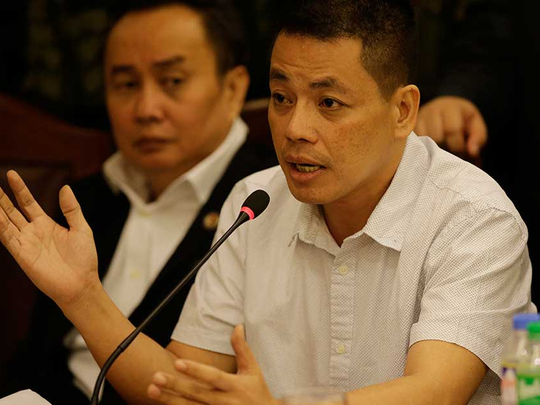
Manila: An inmate of a top-security Philippines prison said jail wardens allowed him to raise money by bringing in highly-paid models for convicted foreign drug lords and by transforming holding cells into sleazy motel rooms.
The prison in question is the national penitentiary in suburban Muntinglupa. The maximum security compound of the National Bilibid Penitentiary (NBP) — by Manila Bay — is called Roxas Boulevard in some circles because of its alleged prostitution rackets.
“With a payment of 100,00 pesos [Dh7,664] payola [bribe to authorities], I was allowed to bring in ten models whom I paid P25,000 each and offered each of them to rich drug convicts for P70,000 to P75,000,” the inmate Herberto Colangco was quoted as telling a congressional hearing late on Tuesday. The complete transcript of the hearing reached the media on Wednesday.
“The P100,000 payola allowed us to bring in other contraband [at the NBP],” Colangco said, adding that these included three truckloads of alcoholic beverages for 300 guests who attended concerts he organised at the prison.
Colangco threw light on the widespread prevalence of corrupt practices at the NBP where he started serving a life term in 2014 over a bank robbery in suburban Laguna in 2008 in which ten people were killed.
In a more damning revelation, Colangco said, “In January 2014, Jaybee Sebastian, [a fellow NBP inmate] invited me to join a drug trade, but I declined the offer. Two weeks after that, Joenel Sanchez, known as the bagman [close aide] of former secretary Leila de Lima, suggested that we push drugs for her political plans.”
“Members of my gang agreed and promised to sell five kilos of shabu every two weeks. My group sold 10 kilos of shabu every month from January 2014 until October 2014,” said Colangco, adding that his group passed on P3 million every month to De Lima during that period through Sanchez.
He also alleged that some P1.2 million was given to former Bureau of Correction chief Franklin Bucayu every month, besides P500,000 to former justice undersecretary Francisco Baraan.
“In November 2014, Sanchez suggested that I centralise the shabu operation [at the NBP]. I was told to order not less than 30 to 50 kilos of shabu [in a week or two] from big-time foreign drug lords; that I should not pay up, but report to him [Sanchez] my sources of shabu — so they [drug lords] will be transferred to another penitentiary. I did not agree with the plan,” said Colangco.
As a result, he was one of less than 20 high-profile convicts who were transferred from NBP to the National Bureau of Investigation’s jail in Manila in December 2014.
Shortly before this happened, he sought audience with De Lima and promised to abide by Sanchez’ planned shabu distribution operation at NBP whereupon the latter assured that his stay at the NBI jail would be temporary, but he remained there for eight months. Sebastian became the top drug dealer at the the NBP during that time, said Colangco.
De Lima has denied allegations that her political campaign was funded by drug money. She is also facing an ethics complaint at the senate over alleged connivance with drug lords. Fellow senators ousted her as head of the senate committee on human rights for bringing up a secret witness who claimed that he had participated in the killing of 1,000 people at the instigation of President Rodrigo Duterte when he was the mayor of southern Davao City.
Rights groups have drawn attention to about 3,000 deaths reported during the course of Duterte’s campaign against illegal drug trade, but law enforcers said that drug syndicates were responsible for more than half of the incidents.
Illegal drug trade in the Philippines was put at $8.4 billion (Dh30.84 billion) a year in 2013, sources said.











